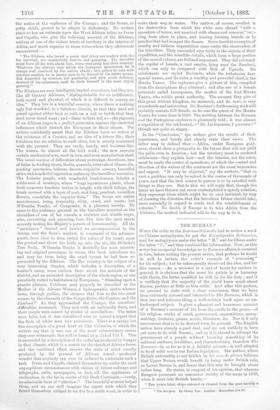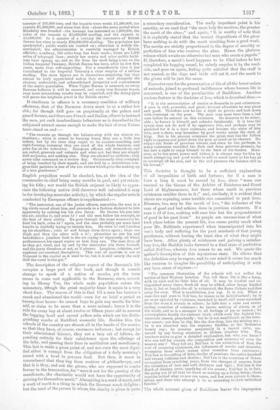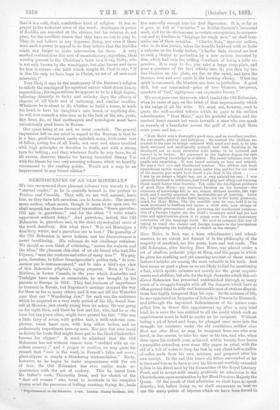THE BURMAN.* Wass the critic to the Batanswill Gazette had
to review a work on Chinese metaphysics, he got the Bacyclopcedia Britannica, read for metaphysics under the letter " M," and for China under the letter " C," and then combined his information. Now, as this writer has no special knowledge as to Burmese affairs, it occurred to him, before writing the present notice, that perhaps he would do well to imitate the critic's example of " cramming" for his subject ; but he subsequently dismissed the idea, and for
this reason :—As a reviewer is a sort of taster for readers in general, it is obvious that the more his palate is in harmony with theirs, the better qualified he will be for his duty ; and it is unlikely that the majority of the world know much about Burma, perhaps as little as this critic. And 'after this preface, we proceed to state with a clear conscience, that we have been extremely amused and interested in The Burman, which is that rare and welcome thing, a well-written book upon an un- hackneyed subject. It gives a pleasant and humorous account of a Burman's manner of life from the cradle to the grave,—of his religion, works of merit, government, superstitions, merry- makings, business, games, music, literature, &c. Nor is it only amusement that is to be derived from its perusal. The English nation have already a good deal, and are not unlikely to have yet more to do with Burma ; and as it is absurd to attempt the government of a people without knowing something of its national customs, traditions, and characteristics, therefore The Burman—in so far as it is a faithful picture—is well adapted to be-of solid use to our Indian legislators. The author, whose British nationality is not hidden by his 1/0/it deplane, believes that Upper Burma would benefit by being under British rule, as Lower Burma is, and hopes that this may be brought about before long. He states, in support of his opinion, that whereas Rangoon possessed no commerce worthy of the name in 1852', when it came into British hands,- " Ten years later, ships entered or cleared from the port havirig-
* The 77'UTC01. By Shway Yoe. London : Macmillan and Co.
tonnage of 295,000 tans, and the imports were worth 21,200,000, the exports 21,400,000, and since that date—about the same period when Mandalay was founded—the tonnage has increased to 1,000,000, the value of the imports to 25,000,000 sterling, and the exports to £4,000,000. In a quarter of a century the commerce -of British Burma has risen to nearly 220,000,000 sterling. The population has quadrupled ; public works are carried on ; education is widely dis- seminated; the administration is carefully managed by British officials ; a railway, 163 miles long, has been made ; there are 1,300 miles of telegraph lines ; stately law courts and other public build- ings have sprung up, and so far from the work being a tax on the Indian Imperial Treasury, British Burma has been, after its few first years, more than self-supporting, For a considerable time it has contributed to the Imperial Treasury a clear surplus of a million sterling. The mere figures are in themselves surprising, but they cannot be truly appreciated unless they are read alongside the obvious, undeniable, and acknowledged prosperity and contentment of the native population. When Upper Burma is annexed, as every Bnrman believes it will be annexed, and every true Burman hopes, even more astonishing results may be expected, and the Ashay-pyee will prove the brightest jewel in the British crown."
If obedience to officers is a necessary condition of military efficiency, that of the Burmese Army must be at a rather low ebb ; for though drill goes on perpetually at the palace and guard-houses, and there are French and Italian officers to instruct the men, yet such insubordinate behaviour as is described in the subjoined extract seems enough to make the hair of even Volun- teers stand on end :- "" The recruits go through the balance-step with the utmost en. thusiasm P . when it comes to forming fours, they are a little lees ardent, but by the time they ought to be counter-marching and right-forming company they are tired of the whole business, and poke fun at the instructor. European officers call themselves, and are called, generals and colonels and what not, but they are simply drill serjeants, and nothing else. They are allowed no uniform ; they never take command on a review day. Occasionally they complain of being insulted by their squads, and are told by a sententious min- gyee that patiehce is one of the ten virtues which go to the making-up of.a true gentleman."
English prejudices would be shocked, too, at the idea of the commander-in-chief being many months in gaol, and yet retain- ing his title ; nor would the British serjeaut be likely to appre- ciate the following native drill (however well calculated it may be for developing muscular activity), by which the regular article conducted by European officers is supplemented :—
" The instructor, one of the junior officers, assembles the men in a big circle round about him, and proceeds in a fashion dictated to him apparently by nothing but his own fancy. He throws his gun into the air, catches it, and cries he ! and the men follow hie example' to the best of their ability. He goes through the same manoeuvre be- hind his back, cries he I again, and the men probably get some hard knocks in dutifully trying to imitate him. He cries lid and hunches up his shoulders ; cries he and brings them down again ; slaps one thigh and then the other with a he ; pirouettes on one leg and brandishes a jointless limb in the air crying ho vigorously, all which perferniances his squad copies as best they can. The men drop off as they get tired, and by and by the instructor sits down himself, and the party dissolves or not, os it•pleases. Laughter, criticism, and applause are constant throughout. This sort of exercise is not so frequent in the capital as it used to be, but it is still nearly the only drill the rural levies get."
The description of the religions aspect of the Burman's life occupies a large part of the book, and though it sounds strange to speak of a nation of monks, yet the term seems in some sort applicable to the Burmese, since, accord- ing to Shway Yoe, the whole male population enters the monastery, through the great majority leave it again in a very short time. The reason of this is that till a man has become a monk and abandoned the world—even for so brief a period as twenty-four hours—he cannot hope to gain any merits for him- self, or claim to be more than a mere animal ; hence it is the rule for every boy at about twelve or fifteen years old to assume the begging bowl and sacred yellow robe which are the distin- guishing marks of Buddhist monastic life. Besides this, the schools of the country are almost all in the hands of the monks, so that they have, of course, enormous influence ; but except for their educational labours, they are a lazy set of fellows, de- pending entirely for their subsistence upon the offerings of the laity, and passing their lives in meditation and mendicancy. This last is made a great point of, and not even the most digni- fied abbot is exempt from the obligation of a daily morning's round with a bowl to procure. food. But then, it must be remembered that they beg from motives of philanthropy, and that it is they, and not the givers, who are supposed to confer favour in the transaction, for " were it not for the passing of the mendicants, the charitable would not have the opportunity of gaining for themselves merit." Almsgiving is a work of merit, and a work of merit is a thing in which the Burman much delights ; but the need of the person fo whom the charity is given is quite a secondary consideration. The really important point is hie sanctity, as we read that "the more holy the receiver, the greater the merit of the alms ;" and again, " It is worthy of note that it is explicitly stated that the inward dispositions of the giver have nothing to do with the merit resulting from a good work. The merits are strictly proportioned to the degree of sanctity or perfection of him who receives the alms. Hence the glorious release which awaits an otherwise bad man who erects a pagoda." If, therefore, a monk's bowl happens to be filled before he has completed his begging round, he calmly empties it by the road- side, and goes on again, feeling quite satisfied that the stuff is not wasted, as the dogs and birds will eat it, and the merit to
the givers will be just the same.
Excessive care for the preservation of life of all the lower orders of animals, joined to profound indifference where human life is concerned, is one of the peculiarities of Buddhism. Another curious feature is the doctrine of kan, which is described thus :-
" It is the accumulation of merits or demerits in past existences. A man is rich, powerful, and great, because aforetime ho was pious and good. Therefore now lie has a right to govern and look down with contempt on the poor. The poor man must have been a bad. • man before he entered on this existence. He deserves to be miser- able ; he knows it himself, and submits fatuitously. It is true th6. tyrant does not do well if ho oppresses him, and perhaps may be punished for it in a later existence, and become the slave of him who, now a slave, may hereafter by good workO attain the rank of king. But in his present existence the great man has the fullest right to oppress and grind down the poor as much as he chooses. He enjoys the fruits of previous virtues, and since he has, perhaps, in many existences mortified the flesh and done grievous penance, he has now a right to enjoy himself to the limit of his desires. More- over, as be has great power and riches, it is always easy for him by much almsgiving and good works to add so much merit to his kan as to outweigh all his sins, and in the end preserve the balance still in his favour."
This doctrine is thought to be a sufficient explanation of all inequalities of birth and fortune ; for if a man is born a king it mast be caused by lean, since "none can succeed to the throne of the Arbiter of Existence and Great Lord of Righteousness, but those whose merit in previous existences entitles them to it ;" and, similarly, it is evident that slaves are expiating some terrible sins committed in past lives. Diseases, too, may be the result of ham, " the influence of the sum of good and bad actions done in previous existences. If a man is ill of km; nothing will cure him but the preponderance of good in his past lives." As people are unconscious of what took place before the present life, /can seems pretty much what poor Mr. Bultitude experienced when transmigrated into his son's body and suffering for the past misdeeds of that young gentleman, without having the least idea of what they might have been. After plenty of existences and gaining a satisfac- tory lectiz, the Buddist looks forward to a final state of perfection called Neleban, wherein kan comes 'to an end. We quote the sinthor's description of this mysterious state. He allows that the definition may be vague; and to our mind it seems too much like vacuum to imagine the possibility of anticipating it with
any keen sense of rapture ;—
" The common illustration of the schools will not suffice for matter-of-fact Western heretics. You tell them life is like a lamp, with its wick and its little lake of oil. It may be kindled and ex- tinguished many times, fresh oil may be added, other lamps kindled from it, but at length the oil is exhausted, the flame flickers and dies away for ever. That is annihilation, you say. It is not. When a man dies and goes to Neh'ban, he ceases to be individualised ; be is no more agitated by existence, wretched in itself, still more wretched from the woes it reveals in others; he falls into a calm and never- ending cessation of existence ; he knows nothing of others, or of the world; and so is a stranger to all feelings of joy or sorrow ; ho contemplates fixedly the abstract truth, which even the highest Inn- materials cannot, perpetually ; but he is not annihilated, n8 the here- tics assert; nor dues he slip, like the dewdrop, into the shining sea ; he is not absorbed into the supreme Buddha, as the Brahmins loosely say ; he remains perpetually in a sacred calm, un- moved by any feeling whatever, in •lifeless, timeless bliss. The teachers strive to give a detailed explanation, but who, can know? who can tell for certain the composition and economy of even the nearest star P They tell us ; Neh'ban is the extinction of Kan, the soul of recurring existences, the u
he htttfleur cessation front exemption from which magus
Neh'ban is the stifling of Seht, the fire of passions, the entire hundred and twenty volitions and desires ; Neh'ban is the cessation of Ootoo, exemption from revolving years, from the changes of seasonsy from the variations of beat and cold, darkness and light ; Neh'ban is the death of Ahahya, taste, typefying all the senses ; Neh'ban is, in fact, the going out of all that we know as making up a living being ; there remains behind what no one can name, and few oven picture to them- selves, end those who attempt it do so according to their individual fancies."
The whole account given of Buddhism loaves the impression that it is a cold, dead, comfortletis kind of religion. It has no prayer in the technical sense of the word ; doxologies in praise of Buddha are repeated at the shrines, but his votaries do not pray, for the excellent reason that they have no one to pray to. They do not believe in any Supreme Being, nor even if there were such a power to appeal to do they believe that the Buddha exists any longer to make intercession for them. A very marked contrast does this sort of unsatisfactory, objectless, ideal worship present to the Christian's faith in. a living Deity, who is not only known by the worshipper, but also knows and cares for him in return—the faith which taught St. Paul to say, "If in this life only we have hope in Christ, we are of all men most miserable !"
Very likely it may be the inadequacy of the Burmau's religion to satisfy the cravings of his spiritual nature which drives him to superstition; for superstitious he appears to be to 'a high degree, believing devoutly in lucky and unlucky days, the efficacy. of charms of all kinds and of tattooing, and similar vanities. Whatever he is about to do, whether to build a house, to wash his head, to have his daughter's ears bored, or anything else, he will first consult a wise man as to the luck of the site, posts, nay, hour, &c., so that soothsayers and astrologers must have uncommonly good times in Burma.
Our space being at an end, we must conclude. The general 'impression left on our mind in regard to the Burman is that he is a lazy, good-tempered, easily-satisfied, noisy, frolicsome sort of fellow, loving fun of all kinds, not over and above troubled with high principles or devotion to truth, and with a strong turn for betting ; and that, whatever faults he may have, he, at all events, deserves thanks for having furnished Shway Yoe with the theme for two very amusing volumes, which we heartily recommend to the reading public. Would not a map be an improvement to any future edition ?




































 Previous page
Previous page